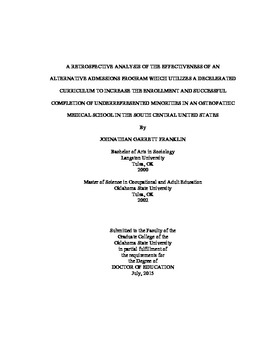| dc.contributor.advisor | Wheeler, Denna | |
| dc.contributor.author | Franklin, Johnathan Garrett | |
| dc.date.accessioned | 2016-04-15T21:49:22Z | |
| dc.date.available | 2016-04-15T21:49:22Z | |
| dc.date.issued | 2015-07 | |
| dc.identifier.uri | https://hdl.handle.net/11244/33417 | |
| dc.description.abstract | The purpose of this quantitative research study was to determine the effectiveness of an alternative admissions program that admits students with lower MCAT, overall undergraduate GPA and undergraduate science GPA into a decelerated medical education program designed to increase the number of students from underrepresented backgrounds (economic, educational and minority). More specifically, this study focused on whether or not this particular program successfully increased the number of underrepresented minorities at an osteopathic medical school in the south central United States and whether those admitted were able to successfully complete medical school coursework and necessary licensure examinations. The study also explored the specialty choices (primary care versus non-primary care) that graduates of the program chose. There has been very little research conducted on the effectiveness of individual programs designed to increase the number of underrepresented minorities in medical schools. It is imperative that studies such as this one be conducted to inform various stakeholders of the outcomes of these efforts. The research questions for this study were addressed using quantitative methodology and existing institutional data for students from entering Class of 2003 to entering Class of 2012. The total student population was 917 with 80 of those being admitted into the decelerated program. This study was a non-experimental study and exploratory in nature. Data analysis techniques included descriptive statistics, bivariate correlations, examining mean differences by conducting t-tests and examining median differences by utilizing the Mann Whitney U Test. The study found that individuals admitted to programs such as the this one do not perform as well on licensing examinations but they do not perform significantly different on medical school coursework as measured by class rank. They do have a slightly higher attrition rate but the ultimate outcome is that the majority can and do succeed in completing medical school and entering into medical practice. The study also examined the graduates of the decelerated program's specialty choices and found that they chose primary care specialties at a slightly lower rate than other graduates of the same medical school but at a much higher rate than the national average for osteopathic medical students. | |
| dc.format | application/pdf | |
| dc.language | en_US | |
| dc.rights | Copyright is held by the author who has granted the Oklahoma State University Library the non-exclusive right to share this material in its institutional repository. Contact Digital Library Services at lib-dls@okstate.edu or 405-744-9161 for the permission policy on the use, reproduction or distribution of this material. | |
| dc.title | Retrospective analysis of the effectiveness of an alternative admissions program which utilizes a decelerated curriculum to increase the enrollment and successful completion of underrepresented minorities in an osteopathic medical school in the south central United States | |
| dc.contributor.committeeMember | Krumm, Bernita | |
| dc.contributor.committeeMember | Moore, Tami | |
| dc.contributor.committeeMember | Mendez, Jesse | |
| dc.contributor.committeeMember | Smith, Kent | |
| osu.filename | Franklin_okstate_0664D_14252.pdf | |
| osu.accesstype | Open Access | |
| dc.type.genre | Dissertation | |
| dc.type.material | Text | |
| thesis.degree.discipline | Higher Education | |
| thesis.degree.grantor | Oklahoma State University | |
